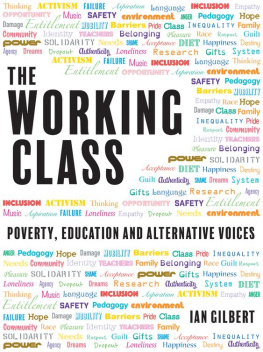For a number of reasons, The Working Class represents an original contribution to the literature around social class and education in the UK.
Firstly, it has a clear sense of who its readership is yet does not assume that they are already steeped in the theoretical canons, so where theory is used it is clearly explained and fully exemplified within each chapter. Secondly, the chapters come from a wide variety of contributors with quite different backgrounds in academia, schools and the arts, which enables a range of distinct voices to be heard and offers insights into the multiplicity of different sites of social class reproduction. A third strength of the book is that, although it is an edited volume containing a diverse range of contributors, there is a coherent narrative voice to bind the collection together. This is achieved through the use of an editorial introduction to each chapter that links it with the previous one, and through the tone of the book the predominant shade of which is a real burning sense of anger at the persistence of the injustices it documents. I am slightly ambivalent about this last point because, although I think this makes it an invigorating and stimulating read, there are some places within the book where this anger tips closer to polemic than argument. This, however, is only a relatively moderate criticism of a very good book.
As a lecturer in this field, I would recommend The Working Class as a perfect text for any course in education studies or in related areas such as sociology.
Andrew Morrison, Principal Lecturer in Education Studies, Sheffield Institute of Education, Sheffield Hallam University
Packed with insightful and expert knowledge, The Working Class may be one of the most important books in education for many years. It is especially welcomed by those of us who still believe that experts have a role to play in society, despite their tendency to offer such annoyances as carefully researched facts and years of experience in their fields.
But that is not what makes it great. What makes it great is love. The love this group of writers share for the importance of education and the aspiration for every child irrespective of social, cultural or economic wealth to have the best possible chance in life.
Many of these writers are fighting that battle from the front line, and they are fighting with a mighty heart. Because thats what this battle needs.
Ben Walden, Founding Director, Contender Charlie
Passionate, lyrical and compelling, The Working Class provides a rich variety of perspectives that collectively challenge contemporary neoliberal orthodoxies. Its chapters are both moving and inspirational, combining sociological imagination with heartfelt narratives. But most importantly the contributors provide a different vision of social class in education one that prioritises inclusion, value and respect for all.
The Working Class is essential reading for all those concerned with inequalities in education.
Diane Reay, Visiting Professor, the London School of Economics and Political Science
This book about education and class pays homage to working class life not only through academic research, but also through an eclectic ensemble of styles ranging from conventional academic writing through to raw, personal narratives expressing the pain of marginalisation.
Reading The Working Class is a visceral experience. The senses and the intellect are awakened and at times assaulted by the passion expressed by the contributors, whether teachers, academics, writers or poets. It is a journey with pit stops mentioning classic theorists on social inequality and education such as Erving Goffman, Paulo Freire, Pierre Bourdieu, Ruth Levitas, Diane Reay and Bell Hooks. The many chapters, a staggering forty-six, cover as many topics starting with failure and activism, and getting to dreams, destiny and diet towards the end. The chapters are interspersed by short interludes or provocations around the topic and are energised by anecdotes from diverse literary and media sources.
Although long, the book is not plodding. It is a romp peppered with statistical data and clips from newspapers, as well as extracts from classic tales from authors such as Victor Hugo, Charles Dickens and Alan Sillitoe depicting working class misery. Passages written in more conventional, academic styles are offset by gritty and deeply moving first person accounts of life in austerity-worn Britain such as that of Jaz Ampaw-Farr, whose contribution rebukes her uncaring, prejudiced, middle class teachers. Most contributions are relatively short, yet there are exceptions, such as Phil Beadles entitled Working Class Pleasures. Beadles contribution is a chilling first person account of living and growing up in abject poverty that focuses a razor-sharp, critical lens on upper class Tory rule, which saturates lives with capitalism, nationalism, tobacco, alcohol, pornography, gambling, addiction, right wing tabloid newspapers and TV programmes promising instant fame. Folded into its primary narrative is a series of footnotes which provides ten factors affecting working class engagement in education and which exposes the double bind of a working class male position in which pride and identity meets an almost compulsory culture of tough, anti-academic machismo.
There are many moving first-hand accounts of growing up, written with rage and passion, exposing what is really happening in the UK. The seemingly intuitive, untethered accounts manage not to rant, however. Some depict pain and achieve poetic profundity, and their language appeals to the senses, depicts contexts and provides attention to detail.
As a collective diffraction of voices, styles and historical lenses, The Working Class does not shirk from complexity and admits of no easy answers indeed, it leaves any final message open, although darkly ominous. Yet, as a rush of sheer, unadulterated, no-holds-barred passion, it reminds us that we are human and that class is a living, willing, desiring disharmony of divergent as well as collective forces that will not be stilled. It is this passion, manifested through a multiplicity of styles from sprawling, raw biographical prose to the contained rationality of academic critique, and via anecdotes, quotes and remembrances inflected with humour, irony and pain that is the books ultimate message. This brimming, unfettered multiplicity of forms is an antidote to the bleak, sterile, smooth diktats of neoliberal rhetoric.
Read this book if you are a new teacher and want to find your moral compass; read it if you are an experienced teacher and feel that you are losing your way, to know that you are not alone and that the madness is not in your head alone. Its the madness of late capitalism that remorselessly creates and recreates working class inequality.
Gabrielle Ivinson, Professor of Education and Community, Education and Social Research Institute, Manchester Metropolitan University
We are often told that poverty is no excuse for underachievement. Poverty is not an excuse it is an explanation, and the contributors to this edited collection powerfully remind us that poverty matters. There can be no understanding the achievement gaps in schools without shining the spotlight on poverty and class in society today. This book does just that, and forces us to reject the lazy stereotypes of bad teachers and feckless children. The contributors remind us that if we mean what we say about inequality in education then we must take bold action to support working class children and their teachers, and at the same time confront the wider inequalities in society that blight the lives of children who live with poverty.





